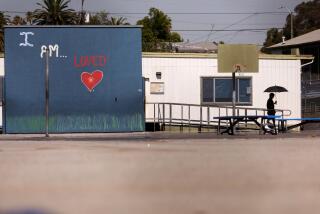Should High School Classes Begin at 9 a.m.?
- Share via
Rep. Zoe Lofgren (D-San Jose) wants teens to be able to sleep later. She is sponsoring legislation that would provide $25,000 federal grants to high schools that open later than 9 a.m. Lofgren, who says it’s time for high schools to synchronize their clocks with their students’ body clocks, cites research that shows high schoolers often snooze through first-period classes. MARY REESE BOYKIN spoke to teens and a teacher about the merits of starting the school day later.
TYSHON LEVY
14, ninth grade, Hamilton High School
I’m glad that someone came up with this idea. If school started later, like at 9 a.m., I would be more ready and motivated to learn.
I get up at 5:30 a.m. My mother wakes me up. I go right back to sleep. When I finally hear the frustration in her voice, I get up.
My bus comes at 6 a.m. I arrive at school at 7:15 a.m. I think that if school started at 9 a.m., students would have more time to get themselves together.
There are students who sleep during first period.
I know that older people say that we teenagers should go to bed earlier, but I can’t go to sleep before 11 p.m. I’m not tired, so I watch TV or talk on the phone.
MELISSA McNEIL
14, ninth grade, University High School
At first, teenagers would say, “Oh, we don’t have to get to school until 9 a.m., so we can stay up later.” We’ll get used to the new time, and those who were late for an 8 a.m. start would fall into their old habits.
At University High, when students are late, they go to the referral room, not to class. The tardiness is counted as an absence. But what I don’t like is that sometimes tardiness can be unavoidable, say, it’s traffic, but the student misses the 1 1/2 hours of instruction.
I like starting school at 8 a.m., especially if a later start means school ends later, at 4 p.m. Getting out earlier gives teenagers more time for themselves. After we have completed our homework, we can watch TV, talk on the phone, listen to the radio.
HAROLD GIM
18, graduate of Marshall High School; entering UCLA
I stay up late and I get up early; it’s no big deal.
If school started at 9 a.m., some students might do their homework in the morning instead of the night before because they assume that they have more time. But it’s better to start early because you get out earlier.
In the morning, once I drink that cup of coffee, I am wide awake. But I would notice that five or six students looked sleepy during first period. My teacher had her way of getting the attention of sleepy students: She would slap a ruler on their desk. I think that what worked well for me is that immediately after the tardy bell rang, the teacher would start the class work.
During my high school years, I noticed that even some teachers were a little drowsy in the morning. They said they weren’t, but I could see it in their eyes.
LATRISHA HALL
16, 11th grade, Westchester High School
Starting school at 9 a.m. is the most wonderful idea. It will help a lot of students academically and cut out a lot of tardiness. The advantage is that your brain will be able to process better and grasp more knowledge by 9 a.m.
During first period, I would doze off because I was still tired. Although I was up by 6 a.m., I was still usually late almost every day. I tried to work on my tardiness, but my body just doesn’t function that early.
I did get detention and my tardiness did affect my grades. I missed out on a lot of things. My teacher wouldn’t repeat what she had said before I arrived in class.
JAMES BERGER
Social studies teacher, Dorsey High School
I don’t see the point. I oppose this proposal for two reasons.
First, I have not seen any empirical evidence that indicates starting the school day later improves students’ achievement and learning. The second reason is that delaying the day could affect the after-school activities, especially in October to December when there is not much evening light.
It doesn’t make sense for Congress to decide something that should be done locally. I don’t mind federal aid to education; that’s great. But the federal government has nothing to do with regulating school hours. The number of hours in a school day are specified by the state. The school district has flexibility in scheduling those hours.
There are extreme cases, usually a medical reason, where some students can’t make it to first period on time; and there are some students who will be tardy to first period, no matter what. They can be assigned detention, talked to by teachers and administrators, required to attend a conference with their parents. When all measures have been exhausted to rectify the student’s tardiness and the student doesn’t improve, that student is dropped from the class.
More to Read
Sign up for Essential California
The most important California stories and recommendations in your inbox every morning.
You may occasionally receive promotional content from the Los Angeles Times.













